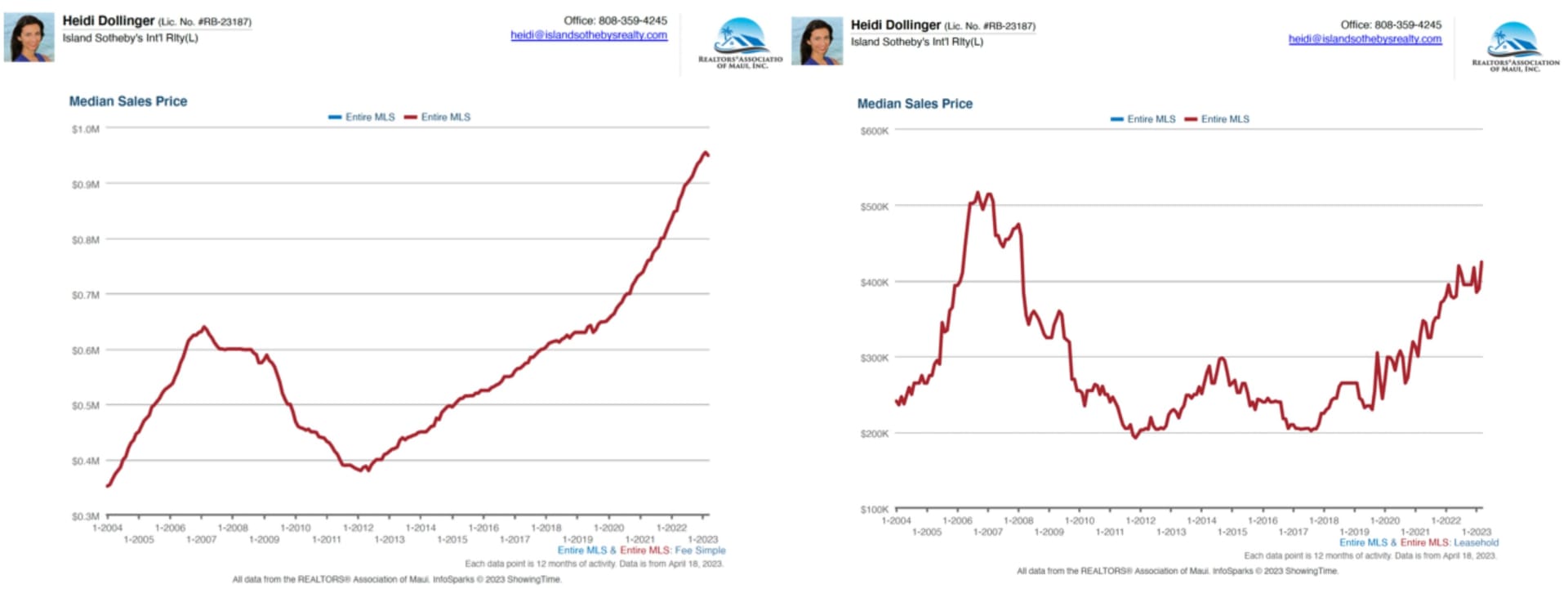Leasehold is a type of property ownership in which one owns a condominium or home for a fixed period but does not own the land underneath. An owner of a leasehold property, called a lessee, will pay lease rent to the landowner (fee owner) for use of the land. This is typically an additional monthly payment. The lessee owns the improvements and the right to use the land for the term of the lease. The lessee pays the full property tax, HOA or maintenance fees, and lease rent.
Historically in Hawaii many properties were originally developed on a Leasehold basis. It allowed developers more access to land for development and save on the cost of acquiring the land. Over the years many properties that were originally leaseholds converted to Fee Simple ownership. These owners were able to buy out the land for an additional cost and convert to Fee Simple. There are still some condominium complexes on Maui where you will find both leasehold and fee units in the same complex, reflecting a past owner’s decision not to buy out the “fee” ownership in the land at the time it was offered, and choosing to continue to own the leasehold interest.
Though not as common as Fee Simple ownership, there are still leasehold properties on Maui today. It is important to understand this type of ownership so you can decide if it is right for you.
Here are a couple of questions you should ask:
- What is the length of the land lease? Land lease terms on Maui properties can vary widely from having only a few years left on the lease to having fifty years + left. To my knowledge, for a Leasehold property to qualify for a 1031 exchange, there would need to be at least 30 years left on the lease. Check with your 1031 accommodator first if you are thinking of exchanging into a leasehold property. The length of the lease will also impact your financing. It is important to find a good match with a lender who is familiar with financing leasehold property. In general, lenders will finance a property for a loan term that is 5 years less than the length of the land lease. For example, if there are 25 years left of the lease, you may be able to get a loan for 20 years.
- What is the monthly lease rent & when is the next renegotiation date? An owner of a leasehold property pays lease rent, which is an additional monthly payment to the landowner for use of the land. The amount will be determined in the Lease, and often the lease rent amounts are fixed for 10-year periods, and then are renegotiated at set dates every 10 years. If you own a leasehold condominium; the HOA may hire an attorney to negotiate on behalf of all the owners. The terms of the lease will spell out how the lease rent can be determined, which usually is a formula based on the appraised value of the land. If market value of the land goes up significantly, so can the lease rent.
A common question asked is “What happens at the end of the lease?” When buying a residential leasehold property in Hawaii you should receive a copy of the actual lease document and any amendments. Refer to the written lease document. The surrender clause provides what happens to the property when the lease expires. At the end of the lease term the lessee must surrender possession of the land. What happens to the buildings and improvements on the land depends on the language of the surrender clause. Some other possible scenarios, though not guaranteed, would be that the landowner could decide to extend the lease term, or decide to sell the land to the lessees, providing an opportunity to covert to fee simple ownership.
Why Buy Leasehold Property?
The cost to buy a leasehold property is less than the cost to buy a comparable fee simple property.
- Leasehold can be attractive to investors who are looking to cash flow on rentals as it lowers the overall cost to obtain their investment and ties up less equity.
- Leasehold can offer increased affordability to lifestyle buyers who want to own in a certain area for less cost.
- Leasehold can be a more affordable housing option.
Resale Value of Leasehold Property
What is your exit strategy? With each passing year of ownership there are less years left on the length of the land lease, potentially reducing the value. Historically, however, the declining number of years left on a lease has not correlated exactly with market value. Leasehold values have tended to correlate with the overall trends of the market as buyers consider all their options. If fee simple properties are rising in value and inventory is low, this has historically brought up the values of leasehold properties. If the number of years left on the lease is coming to an end, however, this could significantly impact the salability unless a lease extension were negotiated.

Fee Simple is the highest and most complete form of real property ownership recognized by law and is the most common type of property ownership in the US including Hawaii. It includes ownership of the land and improvements in perpetuity. Fee simple ownership of a condominium includes ownership of a specific condominium unit and a common area interest percentage ownership in the land owned as an undivided interest with others.











